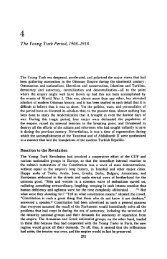Governing property, making the modern state - PSI424
Governing property, making the modern state - PSI424
Governing property, making the modern state - PSI424
You also want an ePaper? Increase the reach of your titles
YUMPU automatically turns print PDFs into web optimized ePapers that Google loves.
nu‘mana as fodder. As a summer crop <strong>the</strong>y might plant two ratl of sorghum, not<br />
broadcast like <strong>the</strong> o<strong>the</strong>r grains but sown with a kind of pipe. For olive oil, like<br />
o<strong>the</strong>rs of <strong>the</strong> village, <strong>the</strong>y would go in <strong>the</strong> autumn to purchase supplies in <strong>the</strong><br />
Jabal ‘Ajlun. They sold <strong>the</strong>ir grain to traders who came to <strong>the</strong> village, especially<br />
from Palestine, ei<strong>the</strong>r directly at <strong>the</strong> threshing grounds or from <strong>the</strong> house, <strong>the</strong><br />
price of a mudd of wheat varying between ten and fourteen qurush when ‘Abdul-<br />
Rahman was young. 16 But <strong>the</strong>y bought little in those days, <strong>the</strong> family buying a<br />
tanaka of paraffin only once a year to light one tiny lamp.<br />
The two bro<strong>the</strong>rs continued to live toge<strong>the</strong>r after Qâsim had married his first<br />
wife, <strong>the</strong> daughter of his uncle ‘Isa al-Ahmad. (Qâsim was later in life to marry<br />
two fur<strong>the</strong>r wives, a Ghazzawiya from <strong>the</strong> Jordan Valley and <strong>the</strong>n a Palestinian.)<br />
It was only after ‘Abdul-Rahman married, to <strong>the</strong> daughter of ano<strong>the</strong>r uncle Salih,<br />
that <strong>the</strong> bro<strong>the</strong>rs divided everything, <strong>the</strong> land and <strong>the</strong> animals. 17 Having thus only<br />
one ox, ‘Abdul-Rahman bought a second and built up his own flock of sheep. His<br />
mo<strong>the</strong>r stayed with him, <strong>the</strong> younger son being <strong>the</strong> favourite (al-saghir mahbub).<br />
His first marriage ended in divorce, <strong>the</strong> spouses not getting along; he <strong>the</strong>n married<br />
ano<strong>the</strong>r cousin, daughter of ‘Isa al-Ahmad, in a happier marriage. In his<br />
description of <strong>the</strong> household of his youth, ‘Abdul-Rahman made no mention of<br />
his older half-bro<strong>the</strong>r Salim. As elder bro<strong>the</strong>r from a different mo<strong>the</strong>r, Salim had<br />
established a separate household before ‘Abdul-Rahman entered <strong>the</strong> world.<br />
‘Abdul-Rahman remained in farming. We can see from his account how a<br />
great household was partitioned among sons, usually along sets from different<br />
mo<strong>the</strong>rs. His was a successful farming family where income from animal raising<br />
and farming had allowed for <strong>the</strong> acquisition of land. Yet <strong>the</strong> generation of his<br />
grandfa<strong>the</strong>r was quite different from his own. ‘Abdul-Rahman’s life was that of<br />
a more modest farmer, who married within <strong>the</strong> family.<br />
Khadija ‘Abdullah Muhammad ‘Abdul-Rahman al-Jammal<br />
Khadija’s fa<strong>the</strong>r’s family is said to have come from <strong>the</strong> region of Nazareth<br />
and to have moved to Kitim in <strong>the</strong> Jabal ‘Ajlun where <strong>the</strong>y were associated with<br />
a family named Duwairiya and acquired <strong>the</strong> name Jammal since <strong>the</strong>y traded in<br />
camels. The family had developed marriage relations with Yafa village in <strong>the</strong><br />
district of Nazareth. Muhammad ‘Abdul-Rahman married twice, first to Hasun<br />
from Yafat al-Nasira, who bore him three sons, ‘Abdullah, Hamad and Salih,<br />
and a daughter Zahra, and <strong>the</strong>n to Nasra al-‘Ubini of Hawwara who bore him<br />
‘Abdul-Rahman. 18 See Figure 11.2 (where Nasra is given as Khadra as in <strong>the</strong> shar‘i<br />
court records). Zahra married a man in Yafa, but when he died she returned with<br />
her two sons to live in Hawwara. According to Khadija three of her fa<strong>the</strong>r’s<br />
bro<strong>the</strong>rs married women from <strong>the</strong> ‘Assaf family of Yafa: her fa<strong>the</strong>r ‘Abdullah<br />
taking as first wife Amina Ahmad al-‘Assaf; ‘Abdul-Rahman marrying Amina’s<br />
sister Hamda; and Hamad marrying Warda al-‘Assaf. Such a cluster of marriages<br />
back to her home village would appear to have been <strong>the</strong> work of Muhammad<br />
‘Abdul-Rahman’s senior wife, Hasun. But we would be mistaken to think that<br />
such marriage exchange was not accompanied by movement of menfolk also:<br />
191<br />
Hawwara












